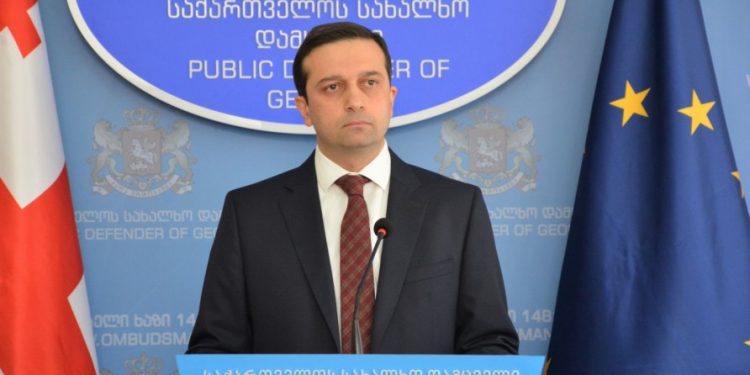The Public Defender has submitted an annual Report on the Situation of Human Rights and Freedoms in Georgia in 2022 to the Parliament of Georgia. The document consists of 347 pages, 31 chapters and 2 annexes. It reviews the challenges identified and progress made in the direction of protection of human rights guaranteed by the Constitution of Georgia, as well as the state of implementation of the recommendations issued by the Public Defender.
In 2022, the human rights situation did not improve significantly, moreover, a significant deterioration was observed in a number of directions.
Undoubtedly, the cancellation of the State Inspector’s Service and the creation of two independent institutions – Special Investigative Service and Personal Data Protection Service, which currently do not have any institutional guarantees for smooth or effective functioning, should be considered among the negative developments. The State can reorganize them at any time.
In addition, the Parliament of Georgia did not consider the preconditions developed by the European Union regarding reforming the judiciary for receiving candidate status. As a result, neither the reform of the High Council of Justice nor the process of improving judicial legislation or eliminating shortcomings is underway.
The preparation of the draft law of Georgia “On Transparency of Foreign Influence” (in 2022) and its subsequent initiation should also be noted among the negative developments.
Decisions made by the Constitutional Court of Georgia raised questions regarding the independence and impartiality of the court. The decision to cancel the State Inspector’s Service is worth noting in this context.
Establishing a politically neutral prosecution system remains a challenge. A number of investigations have revealed significant flaws that do not meet the criteria of an effective investigation or violate the right to a fair trial. For example, the investigations relating to the case of cartographers and Nika Gvaramia are clearly politically motivated.
In recent years, there has been an increasing tendency to restrict freedom of expression in the country, including illegal interference with professional activities, damage to property, assault, persecution, threatening, invasion of privacy, alleged illegal surveillance. The threat of restriction of freedom of expression was exacerbated by the amendments made to the Law of Georgia on Broadcasting, and the number of lawsuits filed against media organizations and their representatives only proves the above.
The right to assembly was again restricted in the reporting period. There were cases of administrative detention of the participants in the assembly due to petty hooliganism or disobedience to the legal request of the law enforcement officers. This practice is based on the Administrative Offences Code adopted in 1984 and it does not meet even the minimum standard of compatibility with human rights and fundamental freedoms.
The investigation into the violent actions committed against LGBTQ+ persons and journalists on July 5, 2021 does not meet the standards of effective investigation. The court of first instance violated the principle of individualization of punishment, as it did not consider the offences committed by specific persons in the past or their personality when determining the punishment.
Against the background of the limitation of democratic space, the amendments made to the Criminal Procedure Code of Georgia on September 6, 2022 (the so-called wiretapping law), which allows investigative agencies to conduct covert investigative activities for a longer period of time, in a wider range of cases, were particularly worrying. * The Constitutional Court has not yet issued a decision relating to the lawsuit filed by the Public Defender of Georgia regarding the wiretapping legislation.
It should be emphasized that the State is responsible for the protection of cultural heritage, and handing over the management of rehabilitation of the Gelati monastery complex to the Patriarchate of Georgia does not comply with the existing legal arrangement.
The penitentiary system is focused on silencing prisoners by various methods. The main problem in this regard is informal governance. The recommendation of the Public Defender regarding the development of a strategy to overcome the existing criminal subculture in penitentiary institutions has not yet been implemented.
The vicious practice of long-term placement of prisoners of closed institutions in de-escalation rooms and solitary confinement cells without legal grounds remains a serious challenge. Prisoners’ access to somatic and psychiatric health services is also problematic, which in some cases may become the cause of prisoner’s death.
The parole mechanism is still flawed, as local parole councils often make different decisions in cases with identical circumstances. It is welcome that the President of Georgia considered the proposal of the Public Defender and by making changes to the Decree on Approving the Pardon Rules, the period of the use of pardon power in relation to persons deprived of liberty for life has been reduced from 20 to 15 years.
In the system of the Ministry of Internal Affairs,the lack of obligation to use body cameras, as well as to make audio and video recordings, remains a challenge. The police premises, where detainees are kept, are still not fully covered by video surveillance systems. Moreover, the number of cameras in the police facility inspected by the National Preventive Mechanism has been drastically reduced. This trend is particularly alarming and represents a drastic step backwards in terms of prevention of ill-treatment.
It should be noted that the process of deinstitutionalizationof psychiatric institutions and children’s large-sized residential institutions began in the country, which had been a repeated recommendation of the Public Defender for years. The 2022-2030 strategy for deinstitutionalization and independent living of persons with disabilities and the 2023-2025 action plan were also approved.
However, patients in psychiatric institutions, who do not require active treatment, cannot leave the institution because of scarcity of community services and the fact they have nowhere to go. It is necessary to increase the number of community services and the geographical coverage area.
In the context of large institutions, the case of Ninotsminda boarding school is important, which concerns the systemic violations of children’s rights in the boarding school, humiliatig, inhuman and torture-like treatment of minors for years. Unfortunately, there are also significant and substantial flaws in the investigation. In some cases, the criminal investigation launched in 2016 is pending and no one has been held accountable yet.
In the context of gender equality, significant changes were made at the legislative level. In particular, the period for carrying out gender quota actions was extended until 2032. The rule for determining and issuing compensation to the victims of violence against women and/or domestic violence has been enacted.
It is a negative phenomenon that the situation of gender-motivated murders of women (femicide) has not improved for years, nor is there a decreasing trend of incidents.
Access to sexual and reproductive health services is a significant challenge, especially for women living in rural areas and women with disabilities. There are still inconsistencies with the standards set by the Council of Europe Convention on Preventing and Combating Violence Against Women and Domestic Violence (for example, the problematic entry of rape in the Criminal Procedure Code). The national referral procedures for identifying, protecting and assisting victims of violence against women and/or domestic violence and ensuring their rehabilitation have still not been approved.
Poverty, and especially child poverty, remains one of the major challenges. Compared to 2021, the number of minors receiving subsistence assistance increased by 40% in 2022 and amounted to 330,148. Despite the growing trend of child poverty, the State has not yet developed an effective mechanism to reduce it.
The quality and continuity of inclusive education, awareness of school staff and parents regarding inclusive education, employment difficulties, and stigmatizing attitude of the employers are still problematic in terms of protection of the rights of persons with disabilities; the substantial participation of persons with disabilities and their organizations in the decision-making process at different levels is also a challenge, including the operation of local councils working on issues of persons with disabilities.
A proper legal definition of a homeless person and the necessary framework legislation for the realization of the right to adequate housing have not yet been developed. There is no unified database on homeless people and in some municipalities there are no local databases.
36% of older people, one of the most excluded and vulnerable groups, are registered in the unified database on socially vulnerable families. Unfortunately, despite the recommendations issued by the Public Defender, the findings of the report on the implementation of the 2017-2018 National Action Plan of the State Concept on Population Aging in Georgia have not yet been considered.
No special rules were developed for the resettlement of IDPs living in damaged buildings. As of the end of 2022, 716 families lived in 35 facilities that pose an increased threat to life and health.
Illegal detention and ill-treatment of citizens are still a continuing practice in the occupied territories. According to the official data, in 2022, 42 people were detained at the occupation line in the direction of Tskhinvali region, and 13 people were detained in the direction of occupied Abkhazia. 69 cases of illegal “borderization” were reported. The most important challenge remains access to education in the native language, which is why the number of students in both occupied regions is decreasing in every year. In order to allow their children to continue studying in the Georgian language, parents have to leave their permanent residence and move to the Tbilisi-controlled territory.
The obstacles faced by national minorities include access to the right to education, proportional and equal involvement in the decision-making process in state agencies, etc.
For years, the Public Defender of Georgia has been calling on the State to create a general policy document designed to combat discrimination and achieve equality. However, no such document has been developed, and moreover, LGBT+ people are not mentioned at all in the National Human Rights Strategy for 2022-2030 approved by the Parliament of Georgia.
The primary health care system is characterized by a shortage of nurses, old infrastructure, weak connections between rural doctors and other specialists, and a complicated and fragmented system of financing primary health care facilities.
It is welcome that as a result of the activity of the Public Defender’s Office, the Dialysis and Kidney Transplantation State Programme has been launched in the highland municipal hospitals of the country from May 2, 2022 and the beneficiaries have been provided with appropriate services.
In order to eliminate the rights violations identified during the reporting period, the Public Defender’s Office drew up 74 recommendations/proposals for the state agencies, 24 special reports and 3 alternative reports for international bodies, 21 constitutional claims, 20 amicus curiae briefs, 1 amicus curiae brief for the European Court of Human Rights, and 5 communications for the Committee of Ministers of the Council of Europe. The Public Defender’s Office made dozens of visits to various institutions to identify and monitor the rights violations and challenges.














